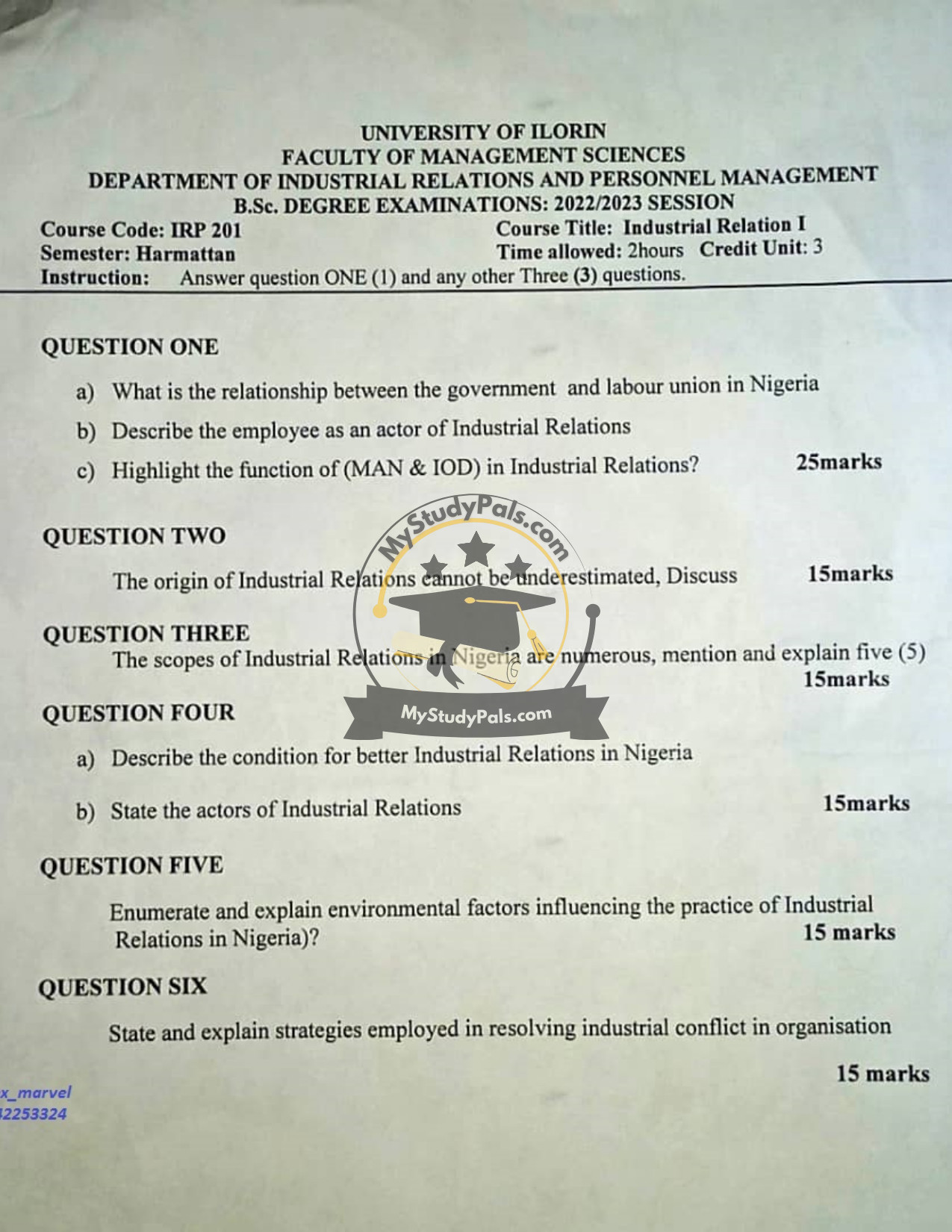ANWSER
Question 1:
a) The relationship between the government and labour unions in Nigeria is characterized by regulation, mediation, and policy formulation. The government enacts labour laws, sets minimum wages, and provides a legal framework for industrial relations. Labour unions advocate for workers’ rights, negotiate wages, and engage in collective bargaining with employers. In some cases, tensions arise when unions demand better conditions, leading to strikes and government intervention.
b) The employee, as an actor in industrial relations, plays a crucial role by contributing labor to the production process and engaging in negotiations through unions or individual bargaining. Employees seek fair wages, job security, and good working conditions. Their actions, including participation in strikes, feedback on workplace policies, and cooperation with employers, shape industrial relations.
c) The Manufacturers Association of Nigeria (MAN) and the Institute of Directors (IOD) play key roles in industrial relations. MAN represents the interests of manufacturing firms, ensuring that government policies favor industrial growth and stable employer-employee relations. IOD, on the other hand, provides leadership and governance guidelines, ensuring that industrial relations policies align with ethical and corporate best practices.
Question 2:
The origin of industrial relations can be traced to the industrial revolution, where mechanization led to mass production and new labor dynamics. It became necessary to regulate employer-employee relationships to prevent exploitation, ensure fair wages, and promote workplace harmony. In Nigeria, industrial relations emerged through colonial influence, leading to the formation of trade unions, labor laws, and collective bargaining mechanisms. Over time, industrial relations evolved into a structured system with government, employers, and workers playing key roles in negotiations and conflict resolution.
Question 3:
The scopes of industrial relations in Nigeria include:
- Trade Unionism: The organization of workers into unions to advocate for better working conditions.
- Collective Bargaining: The negotiation process between employers and employees to determine wages, benefits, and working conditions.
- Labour Legislation: Laws that regulate employment contracts, workplace safety, and dispute resolution.
- Industrial Conflict Management: Methods such as mediation, arbitration, and conciliation to handle disputes between employers and employees.
- Workplace Policies and Ethics: Guidelines that ensure fairness, equity, and discipline in employment relationships.
Question 4:
a) Conditions for better industrial relations in Nigeria include:
- Strong legal framework to protect workers and employers.
- Effective communication between employers, employees, and unions.
- Fair wages and job security to reduce worker dissatisfaction.
- Training and development programs to enhance productivity.
- Efficient dispute resolution mechanisms to prevent prolonged conflicts.
b) Actors of industrial relations include:
- Government: Regulates industrial relations through policies and laws.
- Employers/Management: Responsible for hiring, setting work conditions, and maintaining productivity.
- Employees: The workforce that provides labor and negotiates for better conditions.
- Trade Unions: Advocate for workers’ rights and engage in collective bargaining.
- Employers’ Associations: Represent business interests in negotiations and policy-making.
- Industrial Courts and Arbitration Bodies: Mediate and resolve disputes in industrial relations.
Question 5:
Environmental factors influencing industrial relations in Nigeria include:
- Economic Factors: Inflation, economic downturns, and wage levels affect employer-employee relations.
- Political Influence: Government policies, labor laws, and political stability impact industrial relations.
- Technological Advancements: Automation and digitalization influence job availability and work conditions.
- Social and Cultural Factors: Work ethics, traditions, and societal norms shape employer-employee expectations.
- Legal and Institutional Frameworks: Labour laws, industrial courts, and regulatory agencies determine how disputes are handled.
Question 6:
Strategies employed in resolving industrial conflict in organizations include:
- Collective Bargaining: Negotiations between employers and workers to reach mutually acceptable terms.
- Mediation: A neutral third party facilitates discussions to help parties reach an agreement.
- Arbitration: A legally binding decision is made by an arbitrator to settle disputes.
- Conciliation: An independent body helps conflicting parties find a compromise.
- Grievance Procedures: Internal mechanisms that allow employees to report and resolve complaints.
- Legislative Intervention: Industrial courts and government regulations provide legal resolutions to conflicts.


